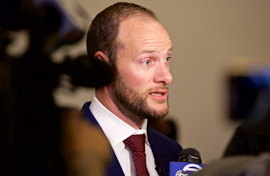|
San Fran. City Supervisor Calls For Coordinated
Response to ORC
"Retailers Have Simply Stopped Calling the Cops."
'Data shows Chesa Boudin prosecutes fewer shoplifters than predecessor'
‘We made an intentional decision to prioritize
crimes involving violence, injury to human beings and use of weapons’
 As
videos of brazen retail thefts in San Francisco draw national attention, The
Examiner has obtained new data showing that District Attorney Chesa Boudin is
prosecuting far fewer shoplifting cases than his predecessor. As
videos of brazen retail thefts in San Francisco draw national attention, The
Examiner has obtained new data showing that District Attorney Chesa Boudin is
prosecuting far fewer shoplifting cases than his predecessor.
The numbers show the prosecution rate for shoplifting cases involving a
misdemeanor petty theft charge for a loss of $950 or less fell under Boudin,
from 70 percent under former District Attorney George Gascon in 2019 to 44
percent in 2020 and 50 percent as of mid-June 2021.
Prosecutors filed charges in 116 of 266 cases presented by police involving
petty theft in 2020, compared to 450 of 647 cases in 2019, according to the
data provided by the District Attorney’s Office.
On the other hand, the prosecution rate for certain organized retail theft cases
remained between 81 and 84 percent under both Gascon and Boudin between 2019 and
2021.
The office charged 35
of the 43 organized retail theft cases presented in 2020, compared to 21 of the
25 cases in 2019.
While the crime trend seen in viral videos of thieves brazenly stealing goods
from Walgreens or Neiman Marcus is not borne out by police data — reports of
shoplifting have actually dropped since 2019 and
remained relatively
consistent over the last decade —
Boudin critics say some
retailers have simply stopped calling the cops.
The situation is
further complicated by the fact that San Francisco has long been an epicenter of
property crimes that are rarely solved by police, meaning the district attorney
only has the opportunity to charge a fraction of the crimes committed.
But critics say the numbers
show Boudin is contributing to the problem.
The data comes with
some caveats & "Boudin has made San Francisco a “magnet for criminals."
The statistics do not, for instance, include shoplifting or organized retail
theft cases charged only as commercial burglaries or robberies since it would be
difficult to parse out similarly charged cases unrelated to thefts from stores.
Also, the prosecution rates only consider charges being filed, and not other
actions taken like motions to revoke probation or referrals to other agencies.
The prosecution rates remain down for shoplifting when those numbers are
included.
While the data falls short of capturing the entire universe of charging
decisions, it still offers some insight as to how prosecutions have changed
under the progressive district attorney, who campaigned on a platform of
reducing mass incarceration.
Critics say the data furthers their argument that Boudin has made San Francisco
an attractive place to commit crimes, such as retail thefts and car break-ins,
without fear of consequence.
&uuid=(email))
By not filing cases or charging strike enhancements that tack on years to prison
sentences, Boudin has
made San Francisco a “magnet for criminals,”
said former Assistant District Attorney Tom Ostly.
“There is absolutely a connection between the rebooking rates and crime going
up,” said Ostly, who prosecuted organized retail theft cases under Gascon until
Boudin fired him after taking office. “If you don’t hold people accountable,
they will do it more.”
Yet Police Commissioner John Hamasaki, a criminal defense attorney who supports
Boudin, said comparing 2020 crime data to any other year is like “comparing
apples to alligators.” Hamasaki said many low-level cases, including for
shoplifting, were not charged as the pandemic required prosecutors to limit the
number of people at the courthouse.
Prosecutors are forced to look at each case and ask, ‘Is this worth it during a
pandemic?’” Hamasaki said.
Boudin said his office has been focused on detecting and dismantling the
organized retail theft and fencing operations driving the problem by selling
goods on the internet or shipping them overseas. Boudin said prosecutors have
“numerous” investigations ongoing into the issue with other law enforcement
agencies around the region and state.
“There is no question that in this moment, as we reopen, there is heightened
awareness of longstanding problems of property crime and retail theft,” Boudin
said. “My office is doing everything we can to make sure that people feel safe
as we reopen.”
San Francisco
Supervisor Ahsha Safai
has been trying to get to the bottom of the issue. A hearing he called to
address drugstore closures in May kicked off the national media frenzy over the
issue.
While Safai knows
police data shows reported incidents going down, he said the crime is becoming
more brazen and frequent. Safai said retailers have reported greater losses from
theft.
“We saw what happened
at Neiman Marcus on Monday,”
Safai said, referring to a viral video of thieves bolting out of the Union
Square store with luxury handbags. “I
have personally witnessed people going in to drugstores with bags and emptying
shelves. That is what is increasing.”
Safai is calling on
prosecutors and police to help put together a coordinated response to the issue.
San Francisco is the only city in the nation where Target has cut its hours
because of retail theft, he said.
“That should say something about the amount of loss that these businesses are
experiencing,” Safai said.
sfexaminer.com
|